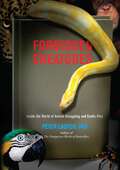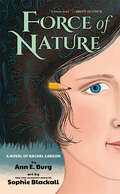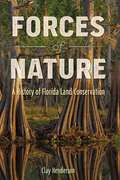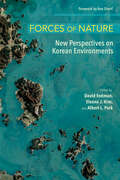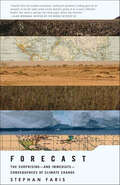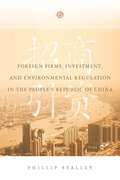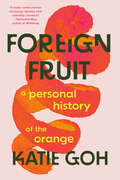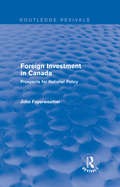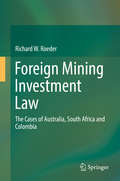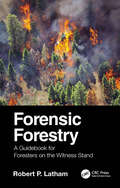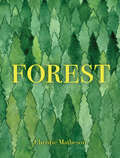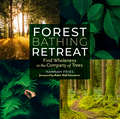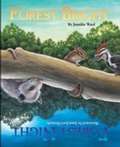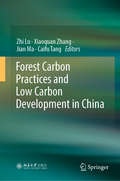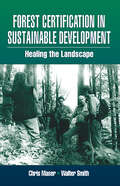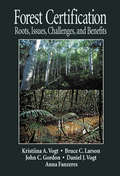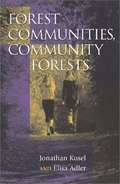- Table View
- List View
Forbidden Archeology
by Michael A. Cremo Richard L. ThompsonThe hidden history of the human race, a remarkably complete review of the scientific evidence concerning human origins.
Forbidden Creatures: Inside the World of Animal Smuggling and Exotic Pets
by Peter LauferOn the heels of his acclaimed The Dangerous World of Butterflies, investigative journalist Peter Laufer is back to chronicle his worldwide quest to penetrate the underworld of international animal smuggling. In Forbidden Creatures, Laufer exposes the network of hunters, traders, breeders, and customers who constitute this nefarious business--which, estimated at $10 to $20 billion annually, competes with illegal drug and weapons trafficking in the money it earns criminals.Laufer asks: What is being smuggled, from where and why? What is being done to stop the illegal trading and irresponsible breeding? Taking readers to exotic and often lawless locales, Laufer introduces brazen and dangerous traders and wealthy customers whose greed and mindless self-interest perpetuate what is now a crisis of survival for a growing number of wild species.Woven throughout with riveting stories from law enforcement officials and federal prosecutors, Forbidden Creatures is a compelling, first-person narrative written in Laufer's hallmark conversational, entertaining style.
Forbidden Desire (Pirate's Prize #3)
by Tina DonahueIn paradise, the only limits to passion lie in your imagination… After a life filled with hardship, landing on a lush tropical isle is heaven on earth for mariner Heath Garrison. And it comes complete with two angels who bring out the very devil in him. Identical twins Netta and Aimee are guileless and seductive, living and loving without jealousy. Days of longing, nights of carnal bliss make choosing one over the other seem impossible, but hungering for both sisters is taboo. Aimee and Netta’s devotion to each other helped them survive the vicious pirates who overran their home. Will a virile Englishman come between them now? When their enemies return, determined to vanquish the islanders for good, Heath races to save them along with his countrymen. But survival will bring a choice—between the life Heath has known, and a love that changes all their destinies…
Forbidden Desires
by Jessica JordanA thrilling tale of kidnapping, murder, money, and passion unfold as a scheming husband tries to rid himself of the wife he no longer wants. Will the criminal hired to dispose of a spoiled white woman master the beauty or will she master him?Taken off the streets of San Francisco and forced into slavery for a Chinese ship's captain, Diana Marke thought she'd never see her husband or infant son again, if she lived long enough to return to America. She never imagined the husband she trusted could commit murder, much less conspire to end her life and that of their child. Neither did she consider the vile man who captured her could ever be more than a criminal in her eyes.Shang cursed himself for ever thinking he could do business with Diana's scheming husband and come out unscathed. Thousands of dollars lost and a possible murder added up to more trouble than a beautiful, spoiled white woman could possibly be worth at auction. She defied him at every turn and enflamed his passion until she filled his every thought. Though he tried to keep her safe and showed her more kindness than any other master, would she ever see him as anything other than a monster?
Force of Nature: A Novel of Rachel Carson
by Ann E. BurgCelebrate spring with this beautiful, hopeful story of a young, impassioned naturalist who grows up to change the world. A great gift for nature lovers and everyone who cares about our fragile planet. Perfect for fans of Wishtree and Wildoak.Jane Addams Children's Book Award WinnerGreen Earth Book Award Winner"With Caldecott-winning illustrator Blackall's signature delicate art . . . a beautifully told, gentle account of a very important person in history, nature, and conservation." -School Library Journal"An absolute joy to read." -Book RiotRachel was a girl who lovedscience and the sea,books and writingand all the creatures of the world.Rachel was quiet,a listener by nature.But when she saw problems,she could not remain silent.Some people thought girlsshouldn't be scientists.They thought girlsshouldn't use their voicesto question or challenge,even to protectall the creatures of the world.Luckily Rachel didn't listento them.
Forces of Nature: A History of Florida Land Conservation
by Clay HendersonThe activists and victories that made Florida a leader in land preservation Despite Florida’s important place at the beginning of the American conservation movement and its notable successes in the fight against environmental damage, the full story of land conservation in the state has not yet been told. In this comprehensive history, Clay Henderson celebrates the individuals and organizations who made the Sunshine State a leader in state-funded conservation and land preservation. Starting with early naturalists like William Bartram and John Muir who inspired the movement to create national parks and protect the country’s wilderness, Forces of Nature describes the efforts of familiar heroes like Marjory Stoneman Douglas and May Mann Jennings and introduces lesser-known champions like Frank Chapman, who helped convince Theodore Roosevelt to establish Pelican Island as the first national wildlife refuge in the United States. Henderson details how many of Florida’s activists, artists, philanthropists, and politicians have worked to designate threatened land for use as parks, preserves, and other conservation areas.Drawing on historical sources, interviews, and his own long career in environmental law, Henderson recounts the many small victories over time that helped Florida create several units of the national park system, nearly thirty national wildlife refuges, and one of the best state park systems in the country. Forces of Nature will motivate readers to join in defending Florida’s natural wonders.
Forces of Nature: New Perspectives on Korean Environments (The Environments of East Asia)
by David Fedman, Eleana J. Kim, and Albert L. ParkBringing together a multidisciplinary conversation about the entanglement of nature and society in the Korean peninsula, Forces of Nature aims to define and develop the field of the Korean environmental humanities. At its core, the volume works to foreground non-human agents that have long been marginalized in Korean studies, placing flora, fauna, mineral deposits, and climatic conditions that have hitherto been confined to footnotes front and center. In the process, the authors blaze new trails through Korea's social and physical landscapes.What emerges is a deeper appreciation of the environmental conflicts that have animated life in Korea. The authors show how natural processes have continually shaped the course of events on the peninsula—how floods, droughts, famines, fires, and pests have inexorably impinged on human affairs—and how different forces have been mobilized by the state to variously, control, extract, modernize, and showcase the Korean landscape. Forces of Nature suggestively reveals Korea's physical landscape to be not so much a passive context to Korea's history, but an active agent in its transformation and reinvention across centuries.This book is freely available in an open access edition through the generous support of the Henry Luce Foundation.
Forecast: Poems
by Chris Bailey&“This is no quaint voice from the Land of Anne. Suffused with our era&’s geist and angst, which have penetrated to the rural periphery, Bailey is a sharp-eyed, clarion-voiced witness.&” —Richard LemmConfessional, candid, and insightful, Forecast: Pretty Bleak looks at life in rural PEI. These poems explore climate change, work, family, love, and the idea that sometimes all you&’ve got is hope for better weather and favourable winds tomorrow.
Forecast: The Surprising—and Immediate—Consequences of Climate Change
by Stephan FarisA vivid and illuminating portrayal of the surprising ways that climate change will affect the world in the near future—politically, economically, and culturallyWhile reporting just outside of Darfur, Stephan Faris discovered that climate change was at the root of that conflict, and began to wonder what current and impending—and largely unanticipated—crises such changes have in store for the world. Forecast provides the answers.Global warming will spur the spread of many diseases. Italy has already experienced its first climate-change epidemic of a tropical disease, and malaria is gaining ground in Africa. The warming world will shift huge populations and potentially redraw political alliances around the globe, driving environmentalists into the hands of anti-immigrant groups. America's coasts are already more difficult places to live as increasing insurance rates make the Gulf Coast and other gorgeous spots prohibitively expensive. Crops will fail in previously lush places and thrive in some formerly barren zones, altering huge industries and remaking traditions. Water scarcity in India and Pakistan have the potential to inflame the conflict in Kashmir to unprecedented levels and draw the United States into the troubles there, and elsewhere.Told through the narratives of current, past, and future events, the result of astonishingly wide travel and reporting, Forecast is a powerful, gracefully written, eye-opening account of this most urgent issue and how it has altered and will alter our world.
Foreign Aid and Emerging Powers: Asian Perspectives on Official Development Assistance (Routledge Explorations in Development Studies)
by Iain WatsonCurrent debates on emerging powers as foreign aid donors often fail to examine the myriad geopolitical, geoeconomic and geocultural tensions that influence policies of Official Development Assistance (ODA). This book advocates a regional geopolitical approach to explaining donor-donor relationships and provides a multidisciplinary critical assessment of the contemporary debates on emerging powers and foreign aid, bringing together economic and geopolitical approaches in the light of the 2015 completion of the Millennium Development Goals (MDGs). Moving away from established debates assessing the advantages and disadvantages of foreign aid, this book challenges the current geopolitical assumptions of the emerging powers concerning issues such as 'south-south' solidarity, shared development experience and 'multipolarity'. It analyses how donor governments 'sell' aid to recipients through enabling different cultural assumptions and soft power narratives of national identity and provides empirical evidence on agendas such as aid effectiveness, aid for trade, public-private partnerships, and green growth aid. The book examines the role of, and relationships between, the leading traditional and emerging power Asian donors specifically, and explores the different and contested perspectives and patterns of ODA policy through an alternative account of emerging power foreign aid to leading African and Asian recipients. This book provides a valuable resource for postgraduate students and practitioners across disciplines such as development economics and geopolitics of development, uniquely approaching the debate from the perspective of emerging powers and donors.
Foreign Firms, Investment, and Environmental Regulation in the People's Republic of China
by Phillip StalleyThis new book takes as its focus a simple yet critical question: Does foreign direct investment lead to weakened environmental regulation, thereby turning developing countries into "pollution havens"? The debate over this question has never before been the focus of a book about China. Phillip Stalley examines the development of Chinese law governing the environmental impact of foreign investors, describes how regional competition for investment has influenced environmental regulation, and analyzes the environmental practices of foreign and Chinese companies. He finds only modest evidence that integration with the global economy has transformed China into a pollution haven. Indeed, after China opened its domestic market, the entry of foreign films largely strengthened the environmental protection regime, including the oversight of foreign firms' environmental practices. Nevertheless, foreign firms (and the competition to lure them) have posed new challenges to controlling industrial pollution. Stalley identifies the conditions under which foreign investment contributes to and undermines environmental protection, offering readers a solid understanding of China's environmental challenges. He also builds on existing theory and provides hypotheses that can be tested with other developing nations.
Foreign Fruit: A Personal History of the Orange
by Katie Goh"A sharp-sweet memoir of change, identity and hybridity. I loved it." ― Katherine May, author of WinteringPer person, oranges are the most consumed fruit in the world. Across the world, no matter how remote or cold or incongruous a climate is, oranges will be there. What stories could I unravel from the orange's long ribboning peel? What new meanings could I find in its variousness, as it moves from east to west and from familiar to foreign?What begins as a curiosity into the origins of the orange soon becomes a far-reaching odyssey of citrus for Katie Goh. Katie follows the complicated history of the orange from east-to-west and west-to-east, from a luxury item of European kings and Chinese emperors, to a modest fruit people take for granted. This investigation parallels Katie&’s powerful search into her own heritage. Growing up queer in a Chinese-Malaysian-Irish household in the north of Ireland, Katie felt herself at odds with the culture and politics around her. As a teenager, Katie visits her ancestral home in Longyan, China, with her family to better understand her roots, but doesn&’t find the easy, digestible answers she hoped for.In her mid-twenties, when her grandmother falls ill, she ventures again to the land of her ancestors, Malaysia, where more questions of self and belonging are raised. In her travels and reflections, she navigates histories that she wants to understand, but has never truly felt a part of. Like the story of the orange, Katie finds that simple and extractable explanations―even about a seemingly simple fruit―are impossible. The story that unfolds is Katie&’s incredible endeavor to flesh out these contradictions, to unpeel the layers of personhood; a reflection on identity through the cipher of the orange. Along the way, the orange becomes so much more than just a fruit―it emerges as a symbol, a metaphor, and a guide. Foreign Fruit: A Personal History of the Orange is a searching, wide-ranging, seamless weaving of storytelling with research and a meditative, deeply moving encounter with the orange and the self.
Foreign Investment in Canada: Prospects for National Policy (Routledge Revivals)
by John FayerweatherThis title was first published in 1973: Why do some states enact stronger pollution control progammes than others? And, do stronger controls have identifiable impacts on environmental quality in these states? This work seeks to answer these question by means of combining data, methods and theory from the natural and social sciences.
Foreign Investment, International Law and Common Concerns (Routledge Research in International Economic Law)
by Francesco Seatzu Seline Trevisanut Tullio TrevesIncreasingly, transnational corporations, developed countries and private actors are broadening the boundaries of their investments into new territories, in search of a higher return on capital. This growth in direct foreign investment involves serious concerns for both the investor and host state. Various exponents of international civil society and non-governmental organisations persuasively claim that such growth in foreign investments constitutes potential and serious hazards both to the environment and the fundamental rights and freedoms of local populations. This book explores from an international law perspective the complex relationship between foreign investments and common concerns, i.e. values that do not coincide, or do not necessarily coincide, with the interests of the investor and of the host state. It pays particular attention to the role of the main international development banks in reconciling the needs of foreign investors with the protection of common concerns, such as the environment, human rights and labour rights. Among its collection of essays, the volume asks how much "regulatory space" investment law leaves; whether international investment law is an effective means of balancing contrasting interests, and whether investment arbitration currently constitutes a mechanism of global governance. In collecting the outlooks of various experts in human rights, environmental and international economic law, this book breaks new ground in exploring how attention to its legal aspects may help in navigating the relationship between foreign investment and common concerns. In doing so, the book provides valuable insights into the substantive issues and institutional aspects of international investment law.
Foreign Mining Investment Law
by Richard W. RoederThis work analyzes and compares the legal framework for foreign investments in the mining sector in Australia, South Africa and Colombia. The admission of foreign investments, corporate structure requirements, ownership of minerals and mineral rights, mining licenses, land access, performance requirements, distribution of profits and the tax regime, repatriation of profits, national and international dispute resolution mechanisms and the question of the Social License to Operate (SLO) / Corporate Social Responsibility (CSR) policies are discussed in detail. The work concludes with an outlook on the future regulation of foreign mining investments and finally suggests the development of an International Mining Investment Law.
Forensic Forestry: A Guidebook for Foresters on the Witness Stand
by Robert P. LathamForensic Forestry: A Guidebook for Foresters on the Witness Stand is a one-of-a-kind, hands-on resource for those forestry and land use professionals called upon to work on legal cases and testify in court. Land use and forestry issues in the United States, in particular—and likewise around the world—have become increasingly contentious, scrutinized, and debated. There is little to suggest that conflicts over forestlands will cease in the near future, in fact, quite the opposite. There are already a number of informative books available on land use and forestry, and related issues under the broader heading of environmental science. As such, while this book will not go into these concepts in detail, if someone is already an expert in land use and forestry, this book will tell them the ins and outs of the legal system and how they can best serve to make a case, using evidence, in a court of law. Coverage addresses the necessary background, and legwork involved, in providing technical expertise for such cases to be adjudicated. Since professionals’ expertise is often focused on ecological issues, chapters look at the economic factors and how money, policy, and corporate interests come into play—the crux of where the professional forester’s ability to present evidence and expertise becomes critical. The author provides an overall understanding of the courts, and the legal process. Coverage includes recommendations to professionals working on cases—and in the courtroom—in how to present evidence and testify in cases over land use and forestland rights, forestry management and safety, criminal and civil cases in liability in forest fires—among myriad others. Key Features: A book by a professional for professionals in the field of forestry and those called to testify in cases of forest and wildfires, eminent domain, land disputes, tort, and liability cases Written in easy-to-read, non-technical jargon to provide tools to best serve as an expert witness and consultant to support attorneys in civil and criminal cases Details unique, real-world cases study examples, detailing how they were adjudicated based on evidence and testimony provided Presents a legal background into the court system, courtroom procedure, the types of legal cases as they relate to forensic forestry As such, Forensic Forestry is a welcome addition to those professionals called upon to consult on, and testify in, such cases including land use professionals, foresters and forestry managers, ecologists, environmentalists, environmental policy advocates, and those in related fields.
Forest
by Christie MathesonA simple introduction to the beauty of forests and the vibrant life within them, from the award-winning author of the acclaimed interactive picture book Tap the Magic Tree.This beautifully illustrated nonfiction children’s picture book begins with a view of the forest at a distance, then zooms in on its fascinating details, including the amazing trees, bright birds, adorable baby animals, and other wonders of nature that inhabit it. The rhythmic text and inviting watercolor illustrations allow curious young readers to observe, explore, and learn what makes forests so special and vitally important.An engaging read-aloud that invites questions and conversation, Forest offers an intriguing introduction to the natural world and encourages little ones to develop a connection with the great outdoors that can last a lifetime. Perfect for any time of year and a beautiful way to celebrate spring, Earth Day, Mother’s Day, or the arrival of a new baby, this endlessly delightful children's nature book includes additional information about forests and what we can do to care for them.
Forest Bathing Retreat: Find Wholeness in the Company of Trees
by Robin Wall Kimmerer Hannah FriesPeople have been retreating to the woods for quiet, meditation, and inspiration for centuries, and recent research finds that time spent in the forest doesn’t just feel good but is, in fact, good for you. Inspired by the Japanese concept of shinrin-yoku, or forest bathing, poet Hannah Fries invites readers to bask in the company of trees, whether in a city park or a rural nature preserve. Fries combines her own reflections and guided mindfulness exercises with a curated selection of inspirational writing from poets, naturalists, artists, scientists, and thinkers throughout the centuries and across cultures, including Japanese haiku masters, 19th century European Romantics, American Transcendentalists, and contemporary environmentalists. Accompanied by beautiful forest photography, Forest Bathing Retreat is a distinctive gift that invites frequent revisiting for fresh insights and inspiration. This publication conforms to the EPUB Accessibility specification at WCAG 2.0 Level AA.
Forest Bathing: Discovering Health and Happiness Through the Japanese Practice of Shinrin Yoku (A Start Here Guide) (A Start Here Guide)
by Dr. Cyndi GilbertAuthor and naturopathic physician Dr. Cyndi Gilbert introduces readers to the art and science of forest bathing, the deceptively simple Japanese practice of spending time in the forest as a way to find peace, rejuvenation, and to promote health.Dr. Gilbert shares her own personal history with the practice—how in the midst of an urban sprawl she lost touch with nature, only to rediscover it through the Japanese practice of Shinrin Yoku or forest bathing. In Forest Bathing, you'll discover the health benefits of Shinrin Yoku, from restoring Vitamin D to balancing your microbiome, along with the rich mental and emotional rewards that spending time surrounded by trees can offer. Forest bathing is a restorative, meditative activity for those who practice it by themselves, but Dr. Gilbert also explores the benefits of practicing forest bathing in community with family and friends. Most importantly, the book offers an easy and practical guide to begin your own forest bathing practice along with a resources section to help you further explore the topic. Learn to tap more deeply into your five senses, practice true mindfulness in sacred woodland spaces, and experience the healing impact of nature wherever you are.Other books in the Start Here Guide Series:Energy Healing: Simple and Effective Practices to Become Your Own HealerMeditation: The Simple and Practical Way to Begin MeditatingChakras: An Introduction to Using the Chakras for Emotional, Physical, and Spiritual Well-Being
Forest Bathing: How Trees Can Help You Find Health and Happiness
by Dr Qing LiThe definitive guide to the therapeutic Japanese practice of shinrin-yoku, or the art and science of how trees can promote health and happinessNotice how a tree sways in the wind. Run your hands over its bark. Take in its citrusy scent. As a society we suffer from nature deficit disorder, but studies have shown that spending mindful, intentional time around trees--what the Japanese call shinrin-yoku, or forest bathing--can promote health and happiness.In this beautiful book--featuring more than 100 color photographs from forests around the world, including the forest therapy trails that criss-cross Japan--Dr. Qing Li, the world's foremost expert in forest medicine, shows how forest bathing can reduce your stress levels and blood pressure, strengthen your immune and cardiovascular systems, boost your energy, mood, creativity, and concentration, and even help you lose weight and live longer.Once you've discovered the healing power of trees, you can lose yourself in the beauty of your surroundings, leave everyday stress behind, and reach a place of greater calm and wellness.
Forest Bright, Forest Night
by Jennifer WardLearn about the animals that make the forest their home by day and at night. This creative approach of looking at animal habitats in the forest puts readers close up to deer, bear, quail, crickets, mice, foxes, and more. <P><P> Someone is always awake in the forest, and someone else is always asleep! Some animals are alert in daytime and sleep at night. Others are alert at night, and are sleepyheads during the day. Be sure to count the animals! You FLIP THIS BOOK from day to night and back―a nice hands-on way to show the same view day and night.
Forest Carbon Practices and Low Carbon Development in China
by Zhi Lu Jian Ma Xiaoquan Zhang Caifu TangThis is the first book illustrating China’s forest carbon projects. It includes an analysis of the policy and future development trends of China’s forest carbon market and showcases the country’s most representative forest carbon projects. Accordingly, it offers a valuable resource for all policymakers and researchers interested in forest carbon, as well as project developers and engineers involved in forest carbon projects.
Forest Certification in Sustainable Development: Healing the Landscape
by Chris Maser Walter SmithFrom recycled products to organic food, the movement to be "environmentally friendly" is now expanding into the forestry field. Recognizing this impact, Home Depot has committed to giving preference to selling "certified wood," proven to come from forests that meet certain biological and social sustainablility standards. Retailers and vendors can o
Forest Certification: Roots, Issues, Challenges, and Benefits
by Bruce C. Larson John C. Gordon Anna Fanzeres Daniel J. Vogt Kristiina A. VogtForest Certification examines the historical roots of forest certification, the factors that guide the development of protocols, the players involved, the factors determining the customers to be certified, and the benefits of certification. It covers terminology and issues that direct the structure of standards, the similarities between indicators of different human disturbances within the ecosystem/landscape, and certification standards. It documents the roles of human values in the development of assessment protocols and demonstrates how elements should be used to produce non-value based standards.
Forest Communities, Community Forests
by Elisa Adler Jonathan KuselFinding a Cafeteria of Possibility in an Array of Community Forestry Case Studies

